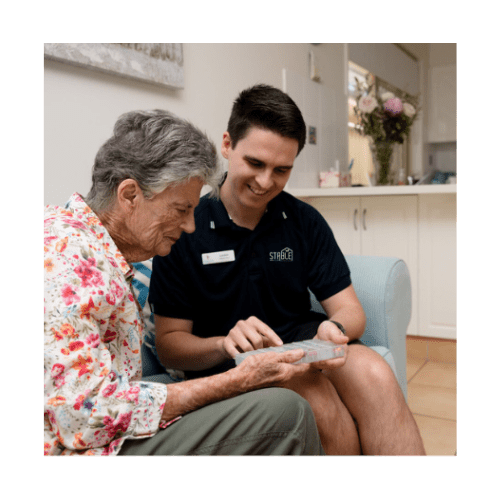Exactly How In Home Treatment Givers Address the Unique Difficulties and Emotional Needs of Households Looking For Support for Their Relatives
At home caregivers play an essential function in browsing the intricacies dealt with by family members looking for support for their loved ones. By comprehending distinct family members dynamics and offering tailored emotional support, these experts not just address immediate care needs yet also cultivate an atmosphere of trust and open communication (ndis plan manager).
Understanding Family Dynamics
Understanding household characteristics is vital for offering effective at home care, as each family members runs within an unique collection of communications and connections. These characteristics encompass various elements, including communication styles, roles, and power frameworks that affect how treatment is supplied and obtained. The caretaker should recognize these factors to guarantee that treatment strategies align with the family members's values and expectations.
Various family members might show distinctive patterns of interaction, such as joint techniques or hierarchical structures. For circumstances, in some families, a primary decision-maker may hold considerable influence, while in others, choices may be more autonomous. Comprehending these patterns helps caregivers customize their techniques to fit the family's particular demands.
In addition, social histories play an essential function fit family members characteristics. Caregivers should be culturally experienced, recognizing and appreciating varied methods and beliefs that might impact treatment choices.
Eventually, an extensive understanding of household characteristics facilitates enhanced interaction, fosters trust, and boosts the caretaker's capability to sustain the household successfully. By identifying the complex web of connections and duties, caretakers can create a supportive environment that advertises well-being for both the private obtaining care and the family members in its entirety.
Giving Emotional Assistance
Offering emotional support is a necessary part of at home treatment that substantially improves the wellness of both the individual receiving treatment and their relative. In the context of caregiving, psychological assistance involves energetic listening, compassion, and recognition of sensations. Caregivers are educated to identify the psychological struggles that households face, such as anxiousness, seclusion, and guilt, and to supply a thoughtful visibility that minimizes these worries.
By cultivating open interaction, caregivers create a risk-free area for relative to express their worries and concerns. This discussion not just encourages emotional launch however additionally reinforces trust fund in between the caretaker and the family members. In addition, caregivers can provide functional approaches to assist households handle tension and promote durability.

Ultimately, the psychological support offered by in-home caregivers improves the high quality of life for both customers and their households, promoting a more thoughtful and understanding caregiving setting. This alternative technique guarantees that psychological demands are resolved together with physical health considerations.
Taking Care Of Daily Care Tasks
Handling day-to-day treatment tasks is a critical aspect of in-home treatment that ensures people get the assistance they need to keep their wellness and independence. Caretakers play an essential duty in helping with tasks of day-to-day living (ADLs), that include bathing, dressing, grooming, and meal preparation. By taking on these responsibilities, caretakers aid ease the emotional and physical worries that families may deal with while from this source taking care of their liked ones.
Along with personal care, caregivers are likewise entrusted with medicine management, making certain that clients comply with prescribed does and schedules. This oversight is important for keeping health and wellness and preventing negative impacts from missed out on or wrong drugs. Caretakers often aid with movement, providing assistance for customers moving around their homes, therefore decreasing the danger of falls and improving general safety and security.

Cultivating Open Interaction
Reliable click over here now monitoring of daily care tasks usually hinges on the quality of communication in between caretakers, customers, and their households. Open up communication promotes an atmosphere where problems, preferences, and responses can be openly traded, making certain that treatment is customized to fulfill individual needs. Caretakers must prioritize normal check-ins with both clients and their families, assisting in discussions that address any type of concerns or modifications in care demands.
Making use of different interaction approaches-- such as in person meetings, phone calls, and composed updates-- can improve understanding and give households with satisfaction. It's vital for more info here caretakers to actively listen, showing compassion and respect for the emotional landscape of the family. Urging inquiries from member of the family can additionally aid clear up treatment strategies and reinforce the caregiver's dedication to transparency.
Additionally, preserving open lines of communication enables caregivers to recognize and respond promptly to any kind of shifts in a customer's health standing or psychological health. This positive method not only enhances the caregiver-client vibrant but likewise encourages families to get involved actively in the care procedure. Inevitably, fostering open communication is essential for boosting the top quality of at home treatment and promoting a helpful ambience for all included.
Building Count On and Relationships
Depend on is the keystone of successful at home care, as it develops a structure for purposeful relationships between caretakers, customers, and their families. Building this trust needs consistent, clear communication and an authentic commitment to the well-being of those included. Caregivers must demonstrate dependability with preparation, adherence to care strategies, and responsiveness to the requirements and choices of customers.
To foster trust, caretakers need to take part in active listening, guaranteeing that households feel heard and comprehended. This entails not just addressing prompt concerns yet additionally anticipating future demands, thereby encouraging households and enhancing their sense of control. Establishing connection through shared experiences and respectful interactions can further solidify these relationships.
Additionally, caregivers must be educated to recognize and deal with the emotional intricacies encountered by family members. By showing compassion and compassion, they can alleviate uncertainties and fears, reinforcing trust fund. Regular updates and check-ins with relative can additionally enhance openness, enabling them to really feel involved and educated regarding their enjoyed one's care.
Inevitably, constructing trust and nurturing relationships in at home treatment is a joint procedure that substantially affects the quality of care provided, cultivating a supportive environment that profits everyone involved.
Verdict
In-home caretakers play an important duty in dealing with the distinct obstacles and psychological requirements of households. By comprehending family dynamics, offering emotional assistance, and fostering open interaction, caretakers enhance the general caregiving experience. Their capability to manage everyday care tasks while developing trust fund and solid partnerships grows an encouraging setting for clients and their households. Ultimately, the caring engagement of caretakers significantly contributes to boosted wellness and durability for those browsing the complexities of caregiving.
Comprehending household characteristics is vital for giving reliable at home treatment, as each family operates within a special collection of partnerships and interactions.Giving psychological support is an essential component of in-home treatment that significantly enhances the wellness of both the individual getting treatment and their family members. By taking on these duties, caretakers assist reduce the psychological and physical burdens that families might encounter while caring for their liked ones.
Efficient administration of day-to-day treatment jobs typically hinges on the quality of interaction in between caregivers, customers, and their family members - ndis plan manager.Trust fund is the foundation of effective at home treatment, as it establishes a structure for meaningful connections in between caretakers, customers, and their families